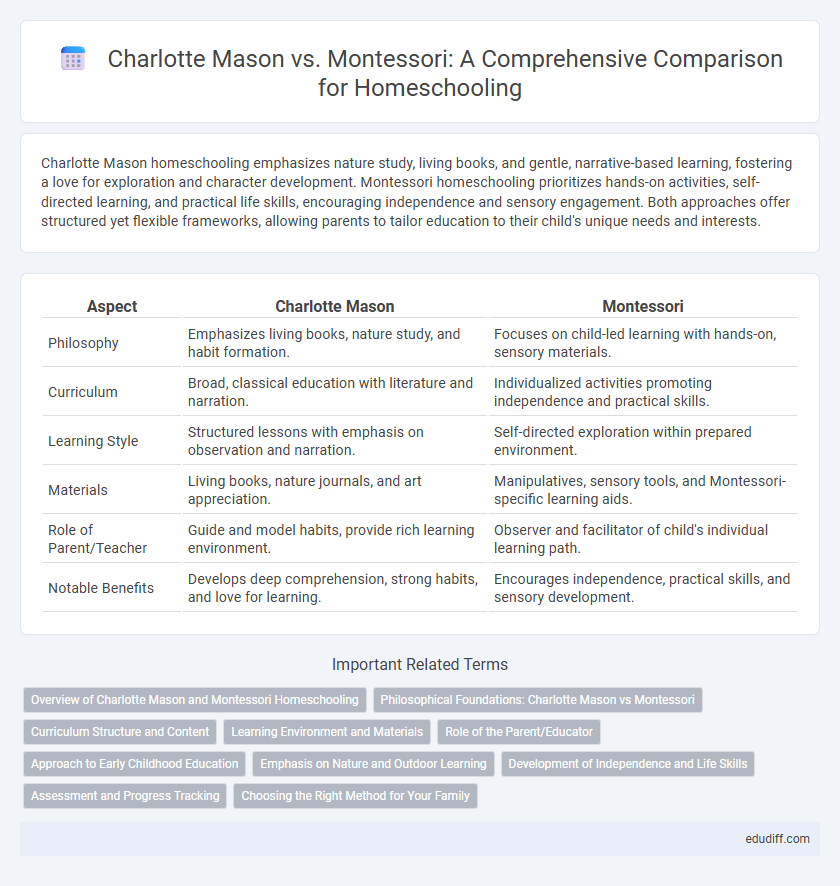Charlotte Mason homeschooling emphasizes nature study, living books, and gentle, narrative-based learning, fostering a love for exploration and character development. Montessori homeschooling prioritizes hands-on activities, self-directed learning, and practical life skills, encouraging independence and sensory engagement. Both approaches offer structured yet flexible frameworks, allowing parents to tailor education to their child's unique needs and interests.
Table of Comparison
| Aspect | Charlotte Mason | Montessori |
|---|---|---|
| Philosophy | Emphasizes living books, nature study, and habit formation. | Focuses on child-led learning with hands-on, sensory materials. |
| Curriculum | Broad, classical education with literature and narration. | Individualized activities promoting independence and practical skills. |
| Learning Style | Structured lessons with emphasis on observation and narration. | Self-directed exploration within prepared environment. |
| Materials | Living books, nature journals, and art appreciation. | Manipulatives, sensory tools, and Montessori-specific learning aids. |
| Role of Parent/Teacher | Guide and model habits, provide rich learning environment. | Observer and facilitator of child's individual learning path. |
| Notable Benefits | Develops deep comprehension, strong habits, and love for learning. | Encourages independence, practical skills, and sensory development. |
Overview of Charlotte Mason and Montessori Homeschooling
Charlotte Mason homeschooling emphasizes a literature-rich curriculum, nature study, and the development of good habits through short, focused lessons and living books. Montessori homeschooling prioritizes hands-on, self-directed learning with specially designed materials that encourage independence and sensory exploration. Both methods value individualized pacing but differ in structure, with Charlotte Mason focusing on ideas and narration, while Montessori centers on concrete experiences and learner choice.
Philosophical Foundations: Charlotte Mason vs Montessori
Charlotte Mason's homeschooling philosophy emphasizes living books, narration, and the development of good habits through a broad, nature-based curriculum grounded in respect for the child as a person. Montessori homeschooling centers on child-led learning, multi-sensory materials, and real-life practical activities to foster independence and intrinsic motivation within a prepared environment. Both methodologies prioritize respect for the child but diverge in structure: Charlotte Mason leans toward a classical, narrative approach, while Montessori adopts a hands-on, discovery-based pedagogy.
Curriculum Structure and Content
Charlotte Mason homeschooling emphasizes a rich, literature-based curriculum with living books, narration, and nature study, promoting deep understanding and critical thinking. Montessori homeschooling focuses on hands-on, self-paced learning through sensory materials and real-world activities, fostering independence and practical skills. Both approaches prioritize child-led exploration but differ in curriculum structure, with Charlotte Mason offering a broad, content-rich education and Montessori providing a structured environment tailored to developmental stages.
Learning Environment and Materials
Charlotte Mason homeschooling emphasizes a rich, nature-filled learning environment with living books and real-life experiences, promoting narration and observation. Montessori homeschooling prioritizes a carefully prepared, orderly environment with tactile, self-correcting materials designed to foster independence and hands-on learning. Both methods use distinct materials and setups to support their unique educational philosophies, shaping children's engagement and development at home.
Role of the Parent/Educator
In Charlotte Mason homeschooling, the parent functions as a guide who cultivates a love of learning through living books and narration, emphasizing gentle discipline and character formation. Montessori homeschooling positions the parent as a prepared environment facilitator, encouraging independence by offering hands-on materials and allowing the child to explore at their own pace. Both approaches require active parental involvement but differ in structure; Charlotte Mason stresses narration and habit training, while Montessori focuses on sensory experiences and self-directed activity.
Approach to Early Childhood Education
Charlotte Mason homeschooling emphasizes rich literature, nature study, and narration to cultivate observation and critical thinking in early childhood. In contrast, Montessori homeschooling centers on hands-on, self-directed activities that foster independence and sensory learning through specially designed materials. Both approaches prioritize child-led exploration but differ in structure and educational tools used for foundational development.
Emphasis on Nature and Outdoor Learning
Charlotte Mason homeschooling prioritizes nature study by encouraging daily outdoor explorations and living books that connect children with the natural world to cultivate observation skills and a sense of wonder. Montessori homeschooling integrates outdoor environments as extensions of the classroom, promoting hands-on learning through natural materials and practical life activities that develop independence and sensory awareness. Both approaches emphasize experiential learning outdoors but differ in methodology, with Charlotte Mason focusing on narration and reflection, while Montessori stresses self-directed interaction with nature.
Development of Independence and Life Skills
Charlotte Mason homeschooling emphasizes cultivating independence through narrations, nature studies, and hands-on activities that nurture critical thinking and personal responsibility. Montessori homeschooling fosters life skills by promoting self-directed learning, practical tasks like cooking and cleaning, and sensory-based materials that develop fine motor skills and confidence. Both methods prioritize autonomy but vary in structure, with Charlotte Mason leaning towards rich literature and discussion, while Montessori centers on experiential learning and real-world tasks.
Assessment and Progress Tracking
Charlotte Mason homeschooling emphasizes qualitative assessment through narration and observation, prioritizing the child's understanding and natural development over standardized tests. Montessori homeschooling incorporates hands-on, self-correcting materials that allow children to track their own progress and teachers to assess mastery practically and continuously. Both methods favor personalized, formative assessment strategies that focus on individual growth rather than traditional grading systems.
Choosing the Right Method for Your Family
Charlotte Mason homeschooling emphasizes living books, nature study, and developing good habits, making it ideal for families seeking a structured yet gentle learning environment. Montessori homeschooling focuses on hands-on, child-led activities with specially designed materials, suited for families valuing independence and tactile learning. Choosing the right method depends on your child's learning style, your teaching philosophy, and the level of parental involvement you can commit to.
Charlotte Mason vs Montessori Homeschooling Infographic

 edudiff.com
edudiff.com